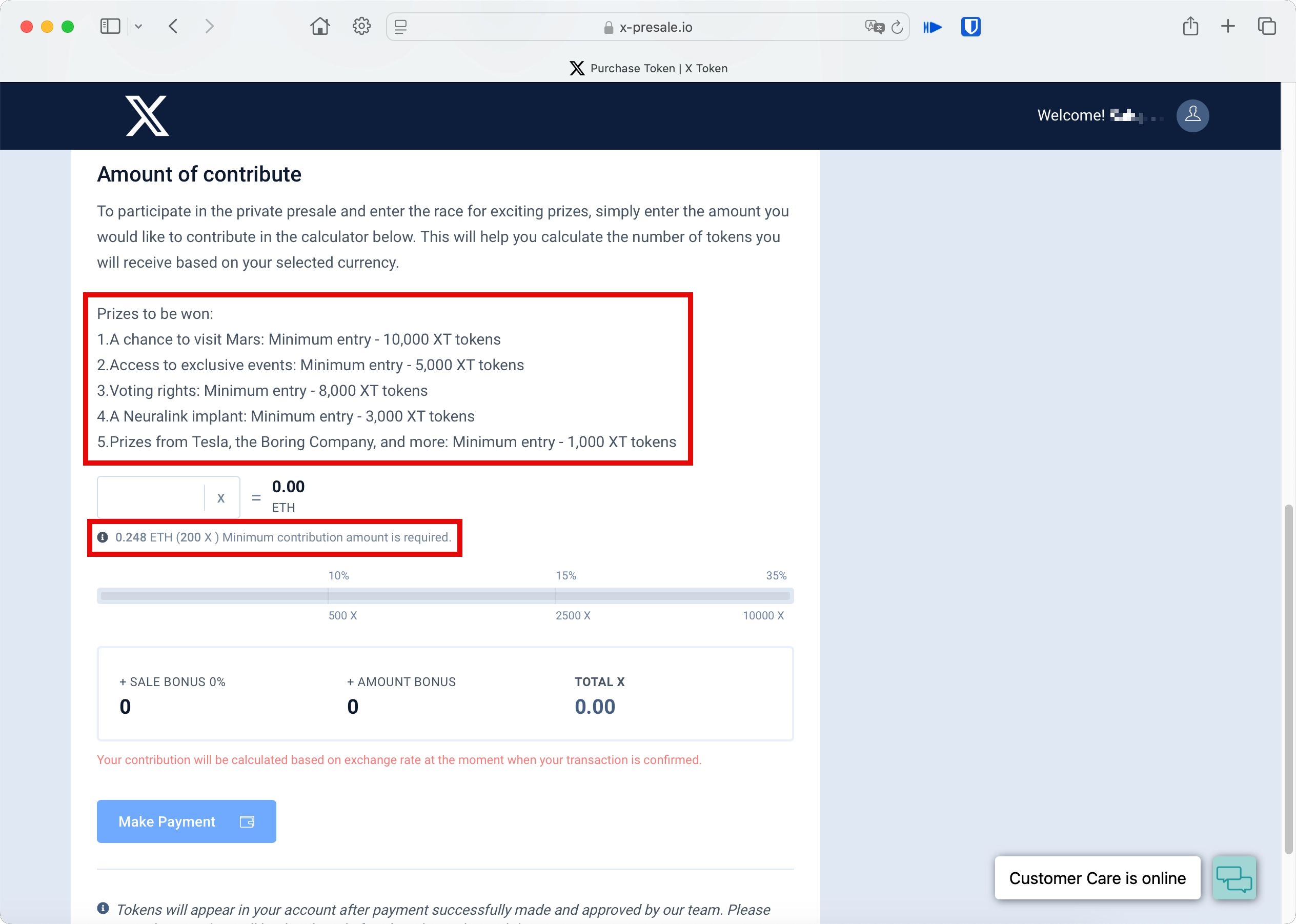X Token Presale scam is a novice crypto fraud, linked to the social network X/Twitter and Elon Musk as its owner. Despite the scam’s longstanding presence, efforts to combat it appear minimal, possibly because of inefficiency. A lot of people found themselves caught in on this lure, so in this post, I will explain what X Token Presale scam is, and how to recognize any of its instances.
X Token Presale Scam Overview
The X Token Presale scam is a deceptive scheme targeting cryptocurrency enthusiasts by promising early access to a revolutionary token at a discounted price. In brief, fraudsters create convincing fake websites and promotional materials to lure investors into transferring their cryptocurrency.
This scam takes advantage of the growing popularity of token presales, dirty promotion methods, and names/symbolism that are on everyone’s lips. While in our case it’s consonance with X (formerly Twitter), it doesn’t add credibility to this scam.
Continuing with the theme of X, interestingly, there is also a legitimate project called “X Project” with a token named X-TOKEN. The real one positions itself as a DeFi initiative with features like a multichain wallet, decentralized exchange, and NFT marketplace. Maybe its name has been exploited by scammers to add credibility to their fraudulent operations.
How Does It Work?
Like many others, the X Token Presale scam operates through a combination of social engineering and technical manipulation. A key aspect of this scam is its connection to X/Twitter as a social media platform and its owner, Elon Musk, widely known for being an outstanding crypto optimist. That is one of the reasons why this social network serves as the primary source of advertising for this scam. As if X didn’t already have a sterling reputation for being a hotbed of scams and bots, this incident truly elevates it to a new level.

Most accounts promoting this scam are hacked in one way or another, with their owners unaware that their X accounts were being exploited for X Token Presale scam spreading. The campaign’s duration suggests a lack of urgent action from the platform moderators in addressing the issue, as some of the spam-distributing accounts even had blue ticks.
Upon clicking the X presale scam ads, users are redirected to websites designed to mimic reputable news outlets. These sites are complete with fabricated articles detailing the launch of the new cryptocurrency and offering access to a “private presale”. Such pages are meticulously crafted, featuring professional designs and persuasive language to lure potential investors.

To participate, users are prompted to create an account, providing personal information and setting up login credentials. Once registered, they see the offer to invest by purchasing the fictitious cryptocurrency, with payment required in established cryptocurrencies like Ethereum.
The minimum investment amount is often substantial, around $900, and transactions are directed to a recently established wallet, so the funds recovery is impossible. Sure enough, nothing says “foolproof investment” like wiring $900 to an anonymous wallet.
The scam employs several technical tactics to enhance its credibility. Among others, domain names that closely resemble legitimate websites related to the crypto industry, reducing suspicion among potential victims. High-quality graphics, layouts, and user interfaces are also utilized to create a sense of legitimacy and trustworthiness. Although after investing, users can log in to view their balance and transaction history, all of which are fictitious and designed to reinforce the illusion of a legitimate investment.
In some iterations of the scam, the perpetrators offered implausible incentives to entice larger investments, such as personalized investment advice from Elon Musk via WhatsApp or entries into raffles to win trips to Mars or Neuralink brain chips. Feels like Nigerian prince scam on steroids and after a healthy bit of modernization.

Red Flags
To avoid becoming a victim of x token presale scam, it is important to know red flags and be able to spot it.
Too-Good-To-Be-True Promises. First, offers of guaranteed returns or exclusive access to presales with minimal risk are classic scam tactics. Remember, in the crypto world, high rewards always come with high risks.
Unverified Endorsements. Scammers often use fake endorsements from celebrities or influencers. In the age of AI, Dark LLM, deepfake and other tools, it’s easy. So, if Elon Musk is suddenly offering you personalized advice via WhatsApp, you’re probably not about to get rich – unless you’re the scammer.
Urgency and Pressure. The human factor is the weakest link in the chain of defense against cyberattacks, so social engineering is a fail-safe weapon against the average Internet user. Scams frequently employ countdown timers or claims of limited availability to push victims into making hasty decisions. Take your time; the internet isn’t going anywhere.
Suspicious Websites. Check for signs of spoofed domains or poorly written content. Although scammers are now paying more attention to the last one, most crypto scam sites are made by a template. Legitimate platforms invest in professional communication and secure web infrastructure.
Payment in Crypto Only. Most cryptocurrency buying platforms support multiple payment methods. Demands for payment exclusively in cryptocurrency, especially to anonymous wallets, should raise immediate red flags.
How to Protect Yourself
Research Thoroughly. Before investing in any project, verify its legitimacy by researching the team, whitepaper, and community feedback. If a project has no credible online presence, steer clear.
Check URLs Carefully. Always ensure the website you’re visiting is authentic. Look for sites established more than several weeks ago and avoid links from unsolicited messages. Also avoid such articles on Telegra.ph, as anyone can post anything there.
Beware of Impersonators. Be cautious of unsolicited messages or posts from accounts claiming to represent celebrities or major platforms. Verify the authenticity of such claims through official channels. Although the case of Trump and trump coin calls this point into question, I recommend not ignoring it.
Enable Security Measures. I emphasize this in almost every post, but unfortunately, it still has a necessity. You should protect your accounts with strong passwords and two-factor authentication to prevent hackers from exploiting them.